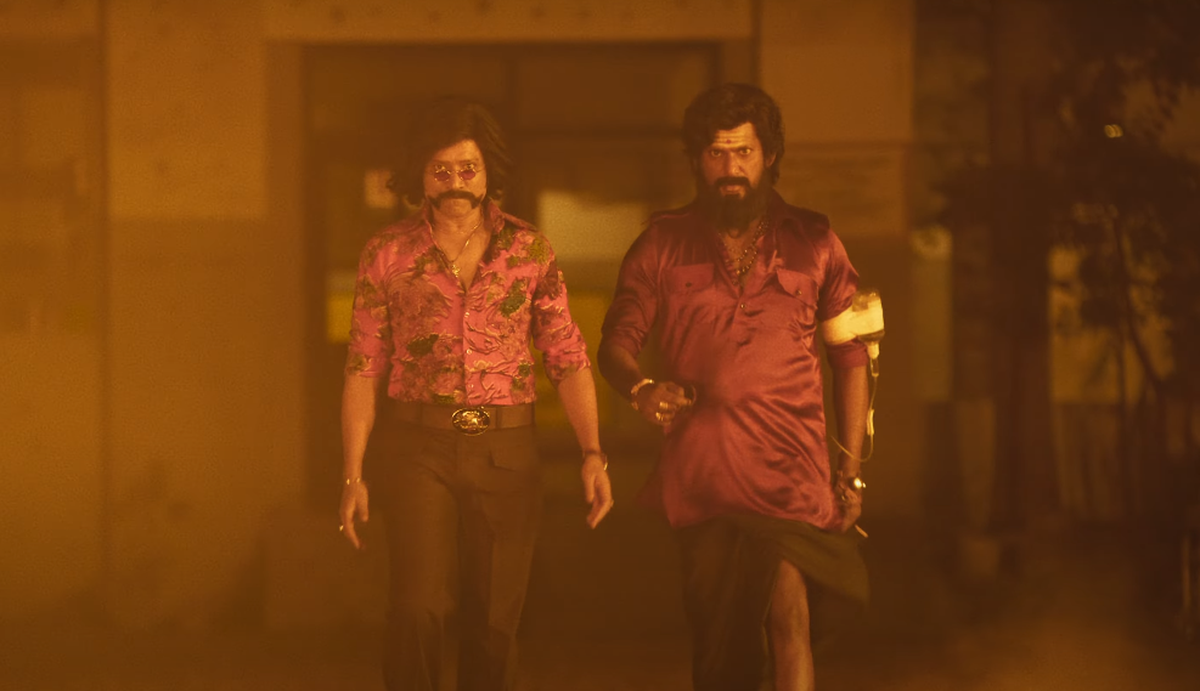Tamil Movie Review: Mark Antony brings back linear time travel with mixed results

After nearly two years of being inundated with multiverse movies at the multiplex, it’s refreshing to see a straightforward time travel film like Mark Antony, which takes cinematic “alternate realities” back-to-basics in approaching time as a linear absolute. It’s also a reminder that multiverse stories have it comparatively easy; when filmmakers enjoy an endless number of parallel realities at their disposal, they can seemingly offer any solution they want to a narrative dead-end. More traditional time travel narratives like Mark Antony require the writers to show more of their math when it comes to the Butterfly Effect, which is typically a more rigorous undertaking.
When onscreen time travel logic is done right, the juice is worth the squeeze: as a viewer, there’s something very satisfying about validating that the math checks out. But the constant arithmetic can also get a little tedious if it’s not being consistently used to take the story in fun new directions, which gets to be the case here after an energetic start.
Mark Antony definitely has enough stylistic swagger, scenery-chewing performances, and goofy aplomb to sustain for a good while, at least until intermission. It moves at a mile-a-minute pace as it initially sets up all of the players and rules of its time travel narrative, allowing the audience just enough breathing room to digest the particulars without getting lost. But make no mistake: meticulous plotting aside, this is an absurdist high-wire act, not a particularly serious piece of sci-fi filmmaking.
The cast is barely holding it together enough (in a good way) to sell us on the internal cohesion of the plot. Despite the film’s title, the story has nothing to do with the Roman Empire or Cleopatra; it’s actually a hollow nod to the earlier Kollywood film Baasha, attempting to cash in on an assumed connection. The story centers on a son and father who just so happen to be named Mark and Antony, respectively (both are played by Vishal). Antony was a gangster who was killed in the ’70s in a fatal club dustup that also left the inventor of a phone-turned-time-machine (yes, you read that right) without a pulse. But when Mark comes across the apparatus 20 years later, he realizes he may have the secret to preventing his father’s death in the past.
Vishal headlines the movie in the titular dual role, and his always-winking performance(s) are consistently fun and endearing, especially as secrets are inevitably revealed about Antony through the process of trying to bring him back. But by far the most entertaining performance belongs to S.J. Suryah as Jackie Pandian, Antony’s best friend and partner, who we quickly begin to suspect may have had more to do with Antony’s death than rival gangster Ekambaran (played by the always-watchable Sunil). Both as the younger version of Jackie in 1975 and as his older self in 1995, Suryah delivers an off-the-wall performance that somehow manages to be both hilariously campy and psychopathically intimidating in the same stroke. He also plays Jackie’s screw-up son Madhan – in a dual role mirroring Vishal’s – to great comedic effect.
Mark Antony revels in its cast’s energy and very confident-feeling filmmaking, strongly supported by Abinandhan Ramanujam’s dazzlingly mobile cinematography and R.K. Vijaimurugan’s sumptuously colorful period art direction. Paired with its creative version of time travel – users of the phone-turned-time-machine can call anyone at any time in the past, but each calendar day can only receive one call so as not to interfere with the linear progression of events – the movie holds our attention for the bulk of its first two acts.
But the exercise grows repetitive as Jackie and Madhan become aware of Mark’s spectacular discovery and use it to pursue a competing agenda of their own in the past. Rather than continuing to be creative and surprising, the attempts to rewrite history grow obvious and uninspired in the later stages of the film, with Mark and Jackie/Madhan taking turns to change (and then un-change) history to their satisfaction by calling their counterparts in the past with advice. It’s clear that filmmaker Adhik Ravichandran and his co-writers, S. J. Arjun and R. Savari Muthu, don’t really know where to take their clever high-concept after a while, so the script mostly spins its wheels as the past keeps being altered based on who’s using the phone. By the same token, the ending feels like an anticlimactic copout; instead of tying everything together in a compelling “aha!” moment, the filmmakers opt for a climactic development that barely makes sense and a coda that undermines any hope of resolution.
There are also some more modest missteps along the way. In particular, a CGI-assisted “cameo” by a certain legend of Tamil-language cinema gives the much-detested Christopher Reeve rendering in The Flash a real run for its money; it’s distasteful and weird, however fleeting. The time would have been better spent finding a way to further develop the actual female lead of the film, Ramya (played by Ritu Varma), who is shorted any truly compelling scenes. Another weakness is the music; less than 24 hours after seeing the movie, I’ve already forgotten the rhythm of all four main songs.
Alas, for as fun as Mark Antony seems to be at the outset, it never coheres into a complete motion picture. While I will fondly remember certain pieces of the film – especially Suryah’s delightfully unhinged acting work – I can’t recommend it on the whole.

